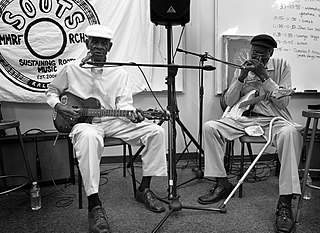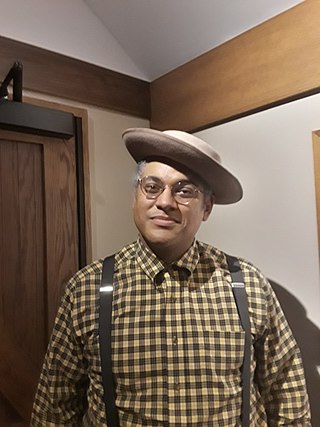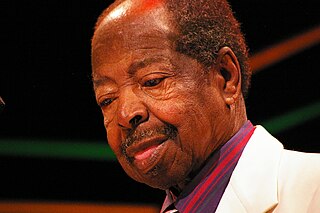Related Research Articles

Henry St. Claire Fredericks Jr., better known by his stage name Taj Mahal, is an American blues musician. He plays the guitar, piano, banjo, harmonica, and many other instruments, often incorporating elements of world music into his work. Mahal has done much to reshape the definition and scope of blues music over the course of his more than 50-year career by fusing it with nontraditional forms, including sounds from the Caribbean, Africa, India, Hawaii, and the South Pacific.

Kevin Roosevelt Moore, known as Keb' Mo', is an American blues musician and five-time Grammy Award winner. He is a singer, guitarist, and songwriter, living in Nashville, Tennessee. He has been described as "a living link to the seminal Delta blues that travelled up the Mississippi River and across the expanse of America." His post-modern blues style is influenced by many eras and genres, including folk, rock, jazz, pop and country. The moniker "Keb Mo" was coined by his original drummer, Quentin Dennard, and picked up by his record label as a "street talk" abbreviation of his given name.

Etta Baker was an American Piedmont blues guitarist and singer from North Carolina.
Music Maker Relief Foundation is an American non-profit, based in Hillsborough, North Carolina. Music Maker Relief Foundation was founded in 1994 by Tim and Denise Duffy to "help the true pioneers and forgotten heroes of Southern music gain recognition and meet their day-to-day needs. Music Maker presents these musical traditions to the world so American culture will flourish and be preserved for future generations."
Robert Lewis Jones, known as both Guitar Gabriel and Nyles Jones, was an American blues musician. Gabriel's unique style of guitar playing, which he referred to as "Toot Blues", combined Piedmont, Chicago, and Texas blues, as well as gospel, and was influenced by artists such as Blind Boy Fuller and Reverend Gary Davis. After hearing of Guitar Gabriel from the late Greensboro, North Carolina blues guitarist and pianist, James "Guitar Slim" Stephens, musician and folklorist Tim Duffy located and befriended Gabriel, who was the inspiration for the creation of the Music Maker Relief Foundation. Gabriel wore a trademark white sheepskin hat, which he acquired while traveling and performing with Medicine Shows during his late 20s.
Neal Pattman was an American electric blues harmonica player, singer and songwriter. Sometimes billed as Big Daddy Pattman, he is best known for his self-penned tracks, "Prison Blues" and "Goin' Back To Georgia". In the latter, and most notable stages of his long career, Pattman worked with Cootie Stark, Taj Mahal, Dave Peabody, Jimmy Rip, Kenny Wayne Shepherd, Guitar Gabriel, and Lee Konitz.
Algia Mae Hinton was an American Piedmont blues guitarist and vocalist, based in Johnston County, North Carolina, United States.

Jarekus Singleton is an American blues guitarist, singer and songwriter. Refuse To Lose was his first nationally and internationally distributed album. It was released on the Chicago-based independent blues record label Alligator Records on May 6, 2014. England's Blues & Rhythm called Singleton "a great, new blues talent…young, original, soulful and intense…superb, blistering guitar." According to Living Blues magazine, "Jarekus Singleton is making some serious blues noise...blending modern-day blues and emotionally intense soul with melodic, hot-toned lead guitar, funk-seasoned rhythms and hip-hop flavored lyrics." The Washington Post said, "Jarekus Singleton is an exciting new young blues guitarist with melody, hooks, swagger and a strong, original voice. His lyrics are modern, personal, acutely poetic and deeply mature." USA Today said of Singleton, "Stinging blues guitar and potent, original songs herald the emergence of a major new talent."
Alvin "Little Pink" Anderson is an American Piedmont blues singer-guitarist. Mentored by his father Pink Anderson, he is known for his authentic performing of his father's style of blues and is highly reputed for his electric guitar skills. Anderson committed himself to a full-time music career in the 1990s, recording albums that cover his father's work.
Richard Leslie Henry, better known as Big Boy Henry, was an American Piedmont blues guitarist, singer and songwriter. His most notable recording was "Mr. President", a protest against cuts in social welfare undertaken by President Ronald Reagan. It won Henry a W. C. Handy Award.
Lightnin' Wells is an American Piedmont blues multi-instrumentalist and singer. He is a proficient musician and regularly plays various instruments in concert including the guitar, mandolin, harmonica, ukulele and banjo. At times he has performed as a one-man band. His style encompasses elements of the blues, country, gospel, old-time, bluegrass and folk. Mark Coltrain stated in Living Blues that, "You won't find a more versatile musician around – able to move deftly between country blues, old-time banjo, and novelty tunes with a single pluck. Lightnin' Wells changes the past..."

George Higgs was an American Piedmont blues acoustic guitarist, harmonicist, singer and songwriter. He recorded three albums in his lifetime, although he spent over sixty years performing regularly, mainly in his home State. In 1993, Higgs was granted the North Carolina Heritage Award from the North Carolina Arts Council.
Brice Lee Gates was an American blues guitarist, singer, and songwriter. The cousin of fellow bluesman Albert Collins, Gates released three albums on the Music Maker label. Gates performed for almost sixty years, for the bulk of that time being resident in Milwaukee, Wisconsin.
Adolphus Bell was an American electric blues musician, best known as a one-man band. He performed in a professional capacity for five decades and released two albums on the Music Maker label. He also played at various music festivals.
Ardie Dean is an American electric blues drummer, audio engineer and record producer. In a varied career over fifty years, Dean has worked with the Giddens Sisters, Alabama Slim, Homesick James, Little Freddie King, Lee Gates, Ernie K-Doe, Bo Diddley, Gregg Allman, Sweet Betty, Guitar Gabriel, Adolphus Bell, Jerry McCain, Macavine Hayes, Beverly Watkins, Lightnin' Wells, Taj Mahal, Cootie Stark, Sam Frazier Jr., Ironing Board Sam, Captain Luke, Cool John Ferguson, and Robert Lee Coleman, among others.

Dominique Flemons is an American old-time music, Piedmont blues, and neotraditional country multi-instrumentalist, singer, and songwriter. He is a proficient player of the banjo, fife, guitar, harmonica, percussion, quills, and rhythm bones. He is known as "The American Songster" as his repertoire of music spans nearly a century of American folklore, ballads, and tunes. He has performed with Mike Seeger, Joe Thompson, Martin Simpson, Boo Hanks, Taj Mahal, Old Crow Medicine Show, Guy Davis, and The Reverend Peyton's Big Damn Band.
James Arthur "Boo" Hanks was an American Piedmont blues guitarist and singer. He was billed as the last of the Piedmont blues musicians.
Carl Rutherford was an American Piedmont blues, country blues, and Appalachian music guitarist, singer and songwriter.

Ed Tigner, Jr., better known as Eddie Tigner, was an American blues pianist, keyboardist, singer, and songwriter. He recorded two albums, both released by Music Maker, and continued to perform on stage each week, despite being in his nineties. He performed standing up at the keyboard latterly, noting "Most keyboard players sit; I can’t anymore. If I sit down to play, I'll go to sleep."
References
- 1 2 Benjamin Franklin V (30 May 2016). An Encyclopedia of South Carolina Jazz and Blues Musicians. University of South Carolina Press. pp. 218–9. ISBN 978-1-61117-622-3.
- ↑ "Cool John Ferguson - Credits". AllMusic. Retrieved 16 April 2019.
- 1 2 3 4 5 6 7 "Cool John Ferguson - Music Maker Relief Foundation". Musicmaker.org. Retrieved 2017-05-31.
- 1 2 3 4 "Cool John Ferguson". Pinecone.org. Retrieved 2017-05-31.
- 1 2 3 4 5 6 7 David Lauderdale (2015-03-21). "Lauderdale: Beaufort's Cool John Ferguson helps keep Southern roots music alive (+ video)". The State. Retrieved 2017-05-31.
- 1 2 "Cool John Ferguson Discography". Discogs.com. 2017-05-26. Retrieved 2017-05-31.
- 1 2 "Cool John Ferguson". Bigpinesbluesfest.com. Retrieved 2017-05-31.
- 1 2 Weeks, Isaac (2016-06-01). "Cool John Ferguson eschews the price tags and stays true to his kind of blues | Features". Charleston City Paper . Retrieved 2017-05-31.
- 1 2 3 4 "Cool John Ferguson brings Lowcountry blues to Mars Theatre | Do Savannah, arts and entertainment news for the Creative Coast". Dosavannah.com. 2014-10-27. Retrieved 2017-05-31.
- ↑ "8 Cool Things About Cool John Ferguson". Lcweekly.com. Retrieved 2017-05-31.
- ↑ "Cool John Ferguson | Credits". AllMusic . Retrieved 2017-05-31.
- 1 2 "Cool John Ferguson | Album Discography". AllMusic . Retrieved 2017-05-31.
- ↑ "Toot Blues (2008) : Plot Summary". IMDB.com. Retrieved 2017-05-31.